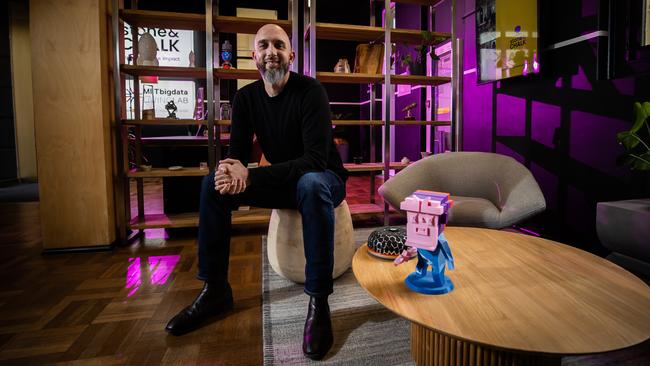Stone & Chalk boss warns of lagging investment in Australian innovation
Stone & Chalk boss Chris Kirk says Australian start-ups are in an intense battle to secure investment from a dwindling pool of funds.

Business
Don't miss out on the headlines from Business. Followed categories will be added to My News.
Australia is falling behind in the global innovation race as local funds pull back from investment in the country’s early stage ventures, Stone & Chalk boss Chris Kirk says.
Approaching a year into the role heading up the country’s largest innovation and start-up hub, Mr Kirk said start-ups were in an intense battle to secure investment from a dwindling pool of funds, and were being forced to delay growth and rein in their ambitions while seeking alternative sources of finance.
“It’s incredibly challenging and competitive for companies to raise, and the valuations through which they’re raising at are often compressed,” he said.
“We’re also seeing companies adjust their capital strategy, so often delaying growth or trying to seek to be more sustainable and less capital intensive.
“Even in the best of times the Australian capital market, certainly versus its global peers, is more risk averse.
“For Australia to remain globally competitive and to play a role in leading real frontier technology, it’s a real risk when you have a capital landscape that is focused on the shortest possible path to revenue, because that, by default, materially changes both the aspirations but also the type of innovation that’s coming out of Australia.”
Mr Kirk said that while some sectors, such as artificial intelligence, were experiencing more joy, capital intensive, pre-revenue ventures were finding it particularly difficult to convince investors to take a risk on new technologies.
“The space industry, hi-tech and companies with longer commercialisation cycles – where they’ve got to raise more money for longer before they start to become revenue producing -those companies are finding it tough and are really having to often go back to the drawing board around their plans.”
After four years heading up Stone & Chalk’s innovation hub in Adelaide, Mr Kirk replaced Michael Bromley as chief executive last September, and relocated back to Sydney last month.
A restructure last October resulted in several redundancies as the not-for-profit looked to shore up its finances amid a tough operating environment for co-working labs and a general decline in funding for start-ups.
Mr Kirk said the organisation had returned to profitability, and was now in a “growth phase”, looking at opportunities to support start-up businesses operating from its four sites in Sydney, Melbourne and Adelaide, but also others in other parts of the country.
“We have an ambition to really be an innovation engine all around Australia and we’re in a rapid growth phase,” he said.
“Innovation precincts are fantastic, almost front doors for entrepreneurship, and they make these hi-tech opportunities visible.
“We would love to expand our footprint and to support innovation precincts in places like Brisbane and Perth, and that will happen, but for now our focus really is on how do we scale Stone & Chalk programming, community expertise to innovators regardless of whether they’re sitting in one of our precincts our elsewhere.”
Stone & Chalk’s Adelaide start-up hub at the Lot Fourteen precinct hosts about 60 businesses.
Since its launch in 2019, the hub’s residents have raised about $206m, including more than $60m in the past 10 months alone.
Mr Kirk said recent fundraising success had helped Adelaide to crack into Startup Genome’s top 100 global ecosystems for the first time this year, along with the evolution of the Lot Fourteen precinct into the “centre of gravity” for the state’s innovators and entrepreneurs.
“What we see as a tremendous opportunity in South Australia is to build on what we’ve done at Lot Fourteen across the broader state,” he said.
“There’s a whole network of innovation districts, precincts, programming and people with great ideas right across the state, and my agenda is to help more founders succeed – to really help them go further, faster.
“That’s things like accessing capital, getting tapped into customers and helping them to get into international markets as well.”




